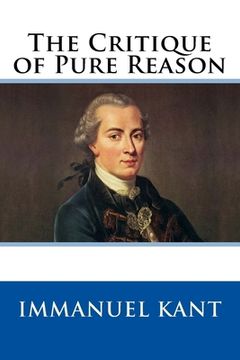Share
The Critique of Pure Reason (in English)
Immanuel Kant
(Author)
·
Createspace Independent Publishing Platform
· Paperback
The Critique of Pure Reason (in English) - Kant, Immanuel
$ 8.28
$ 10.49
You save: $ 2.21
Choose the list to add your product or create one New List
✓ Product added successfully to the Wishlist.
Go to My WishlistsIt will be shipped from our warehouse between
Thursday, May 09 and
Friday, May 10.
You will receive it anywhere in United States between 1 and 3 business days after shipment.
Synopsis "The Critique of Pure Reason (in English)"
The Critique of Pure Reason is a book by Immanuel Kant that is considered one of the most influential works in the history of philosophy. Also referred to as Kant's First Critique, it was followed by the Critique of Practical Reason (1788) and the Critique of Judgment (1790). In the preface to the first edition Kant explains what he means by critique of pure reason, stating "I do not mean by this a critique of books and systems, but of the faculty of reason in general, in respect of all knowledge after which it may strive independently of all experience." The Critique is an investigation into the foundations and limits of human knowledge, and the extent to which the human mind is able to engage in metaphysics. Kant builds on the work of empiricist philosophers such as John Locke and David Hume, as well as rationalists such as Gottfried Wilhelm Leibniz and Christian Wolff. He expounds new ideas on the nature of space and time, and claims to provide solutions to Hume's scepticism regarding human knowledge of the relation of cause and effect, and René Descartes' scepticism regarding knowledge of the external world. Kant claims to enact a 'Copernican revolution' in philosophy with his doctrine of transcendental idealism, according to which our knowledge does not "conform to objects", but rather objects "conform to our knowledge". According to Kant's doctrine, the human mind shapes and structures the world of experience, making knowledge possible.
- 0% (0)
- 0% (0)
- 0% (0)
- 0% (0)
- 0% (0)
All books in our catalog are Original.
The book is written in English.
The binding of this edition is Paperback.
✓ Producto agregado correctamente al carro, Ir a Pagar.

